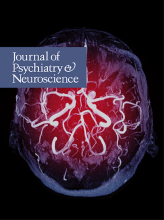Mr. A is 55-year-old patient with depression who only had a partial response to bupropion, 300 mg/d. Upon referral, his symptoms were of moderate intensity (Hamilton 17-item scale: 23), and he was not taking any antidepressants. He was randomly allocated to receive atomoxetine, up to 80 mg/d, in a clinical study and showed minimal improvement after 6 weeks (Hamilton 17-item scale: 18). Atomoxetine was decreased to 60 mg/d, once in the morning, and escitalopram, 10 mg, was added. This produced marked improvement, but the patient later discontinued his treatment and relapsed. The reintroduction of the same regimen did not help. Moclobemide was substituted for escitalopram without success and was then stopped. Bupropion was reintroduced at 150 mg/d with ongoing atomoxetine and titrated to 150 mg twice a day after 1 week. Five weeks later, the patient was in remission with a score of 7.
No one doubts that the antidepressants desipramine, nortriptyline and maprotiline exert their therapeutic action mainly through the inhibition of norepinephrine (NE) reuptake, unlike bupropion, which has an affinity that is 5000 times weaker for NE reuptake transporters (Tatsumi et al, Eur J Pharmacol 1997;340:249–58). Because of their tricyclic moiety, tetracyclic in the case of maprotiline, these antidepressants also exert anticholinergic, adrenergic and histaminergic side effects, notwithstanding their potentially fatal toxicity in overdosage. Reboxetine is a nontricyclic selective and potent NE reuptake inhibitor that is efficacious in treating major depression but is devoid of affinity for various receptor sites (Wong et al, Biol Psychiatry 2000; 47:818–29). It can still, however, exert pseudocholinergic side effects like dry mouth and constipation because of its NE-enhancing property (Mucci, J Psychopharmacol 1997;11:S33–7). In addition, it may raise blood pressure in a small percentage of individuals and will increase heart rate by a few beats per minute, which is a thumbprint of NE reuptake inhibition. Reboxetine is on the market in many countries, but not in North America.
Atomoxetine is a potent NE reuptake inhibitor available in North America, with the indication of attention-deficit disorder (ADD). The drug was developed on the basis that desipramine is efficacious in ADD (Wilens et al, Am J Psychiatry 1996;153:1147–53; Biederman et al, J Am Acad Child Adolesc Psychiatry 1989;28:777–84). This raises the issue of whether atomoxetine could be useful in the treatment of depression. In fact, this medication was first investigated in depression (Chouinard et al, Psychopharmacology [Berl] 1984;83:126–8), but a large failed trial in which neither desipramine nor atomoxetine separated from placebo largely served to stop its development for that indication. Reports are now emerging of its beneficial action as an augmenting strategy in treatment-resistant patients (Carpenter et al, J Clin Psychiatry 2005;66:1234–8; Kratochvil et al, J Am Acad Child Adolesc Psychiatry 2005;44:915–24). From a practical point of view, it would be a worthwhile option if one were considering a desipramine/nortriptyline augmentation, or if there was an earlier diagnosis of ADD. Like reboxetine, it is not a tricyclic and does not carry the negative burden of the tricyclics. It also has minimal negative impact on sexual function (Adler et al, Ann Clin Psychiatry 2006;18:107–13). It is important to mention that it is metabolized by the cytochrome P450 (CYP) 2D6 and therefore its plasma level will be elevated about 3–4-fold in poor metabolizers of CYP2D6 (Sauer et al, Clin Pharmacokinet 2005;44:571–90). In such individuals, however, the discontinuation rate due to side effects was not significantly higher than in normal metabolizers, despite a greater sideeffect burden. When used in association with the potent CYP2D6 inhibitors paroxetine and fluoxetine, the doses should be more conservative.
Given that options are limited in patients who develop a problematic sexual dysfunction when taking serotonin reuptake inhibitors, atomoxetine could represent a valuable monotherapy option. Because it is not indicated for depression, one may choose to use atomoxetine as add-on therapy first and then slowly taper off the SSRI, or carry out a gradual cross taper.
Footnotes
To submit questions for this regular feature, please send them to the editors-in-chief at jpn{at}cma.ca. Please include details of any relevant case and your name, address, telephone and fax numbers, as well as your email address.
The information in this column is not intended as a definitive treatment strategy but as a suggested approach for clinicians treating patients with similar histories. Individual cases may vary and should be evaluated carefully before treatment is provided.
Competing interests: Dr. Blier is a consultant with Biovail, Eli Lilly, Forest Laboratories and Lundbeck and is a contract employee with Forest Laboratories. He is in the speaker’s bureau for Cyberonics, Eli Lilly, Forest Laboratories and Lundbeck and has received grant funding from Eli Lilly and Forest Laboratories.






